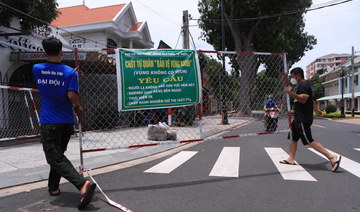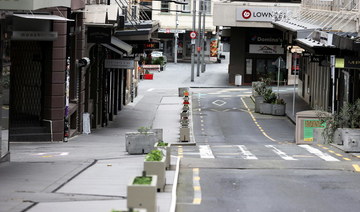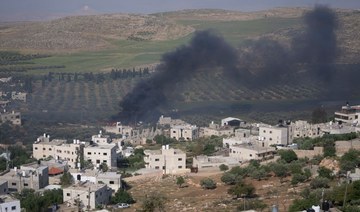SAO PAULO: Bars in Sao Paulo are full again for evening happy hours, lawmakers in the capital of Brasilia have nearly done away with video sessions via Zoom, and Rio de Janeiro’s beaches are packed. Calls for strict social distancing seem but a memory.
Brazil appears intent on returning to pre-pandemic normalcy, even as its death toll tops 600,000, according to official data on Friday from the health ministry. Relief in both COVID-19 cases and deaths have been particularly welcome given experts’ warnings that the delta variant would produce another wave of destruction in the country with the second-most victims. So far, that hasn’t materialized.
The country’s average daily death toll has hovered around 500 for a month, down sharply from more than 3,000 in April. Almost 45 percent of the population is fully vaccinated, and a booster shot is being administered to the elderly. A greater percentage of Brazilians are at least partially vaccinated compared to Americans or Germans, according to Our World in Data, an online research site.
Improvement has encouraged mayors and governors to admit fans into soccer matches, and let bars and restaurants stay open until the wee hours. Some are even contemplating the end of mask mandates, which people often ignore already.
Marcelo Queiroga, Brazil’s fourth health minister since the pandemic hit, suggested in a press conference on Friday that masks should not be mandatory. “Why would I pass a law to force people to use condoms? Don’t even think of it,” he said.
Rio’s mayor has announced plans to bring back the city’s massive New Year’s Eve party on Copacabana beach.
Gonzalo Vecina, a professor of public health at the University of Sao Paulo, told The Associated Press in July that delta, which is more contagious, would cause “a new explosion” of cases within weeks. He was hardly alone among experts sounding the alarm.
Now, Vecina believes the high number of Brazilians infected earlier this year with the gamma variant — first identified in the Amazonian city Manaus — may have slowed delta’s advance.
“That isn’t a conclusion from a study; it is a possibility we are raising in the face of what we are seeing,” Vecina said. “We are seeing delta rise in countries that reopened just as much as Brazil, and our number of cases is still going down, with few very particular exceptions.”
Some analysts remain worried about delta’s potential to spread. Among them is Miguel Lago, executive director of Brazil’s Institute for Health Policy Studies, which advises public health officials. He believes authorities are taking considerable risk by reopening too much and announcing celebrations, and that Brazil may soon see more hospital admissions.
“The pandemic has waned, but 500 deaths per day is far from good. And we don’t even have half the population fully vaccinated,” Lago said. “We just don’t know enough and we have this horrific milestone to contemplate now.”
Friday morning, on Copacabana where Rio’s New Year’s party will take place in less than three months, activist group Rio da Paz held a memorial on its sands to mourn the 600,000 dead, with hundreds of white kerchiefs strung on lines.
Across town, at a support group for family members of the virus’ victims, Bruna Chaves mourned the loss of her mother and step-father.
“It’s not just 600,000 people who are gone; it’s a lot of people who die with them, emotionally,” Chaves said in an interview. “It’s absurd that people treat it like it’s a small number. It’s a big number.”
Many in Brazil continue to downplay the pandemic’s severity, chief among them President Jair Bolsonaro, whose popularity has sagged largely due to his government’s chaotic pandemic response. But he hasn’t veered from his positions, including staunch support for drugs proven ineffective against the virus, like hydroxychloroquine.
He also continues to criticize restrictions on activity adopted by mayors and governors, saying Brazil needed to keep the economy humming to avoid inflicting worse hardship on the poor. On Thursday night, during a live broadcast on Facebook, he showed a series of newspaper articles reporting economic turmoil in Europe and the US last year in an attempt to prove he was right all along.
Months after its New Year’s bash, Rio will also host Carnival, according to Mayor Eduardo Paes. And he said social distancing is out of the question.
“That would be ridiculous, asking people to keep one meter away. If that were the case, I would be the first to disrespect that,” he told residents in a middle-class neighborhood on Monday. “Science has advanced, it won, it is allowing us to open.”
Brazil’s long history with vaccination campaigns has played a significant role in slowing the virus’ spread, with broad uptake. Nearly three-quarters of Brazilians have received at least one dose so far — despite the fact Bolsonaro spent months sowing doubt about their efficacy and remains unvaccinated himself. Even most of his supporters rolled up their sleeves.
Queiroga said all Brazilians between ages 18 and 60 will be able to get vaccinated again next year. He added more than 354 million shots will be available. Brazil’s population is of approximately 210 million.
“The scenario looks positive and I promise that Brazilians will have an efficient immunization campaign in 2022 and that will be the year the COVID-19 pandemic ends,” the minister said.
Brazilians seek pre-pandemic normalcy even as COVID-19 deaths top 600,000
https://arab.news/r6eq6
Brazilians seek pre-pandemic normalcy even as COVID-19 deaths top 600,000
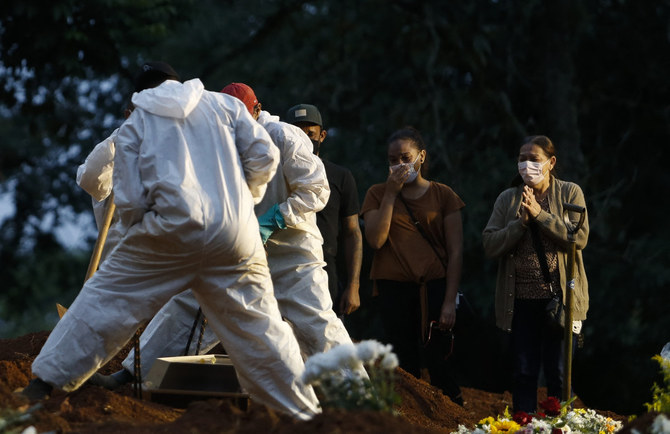
- The country’s average daily death toll has hovered around 500 for a month, down sharply from more than 3,000 in April
- Almost 45 percent of the population is fully vaccinated, and a booster shot is being administered to the elderly
US sanctions fundraisers for extremist West Bank settlers who commit violence against Palestinians
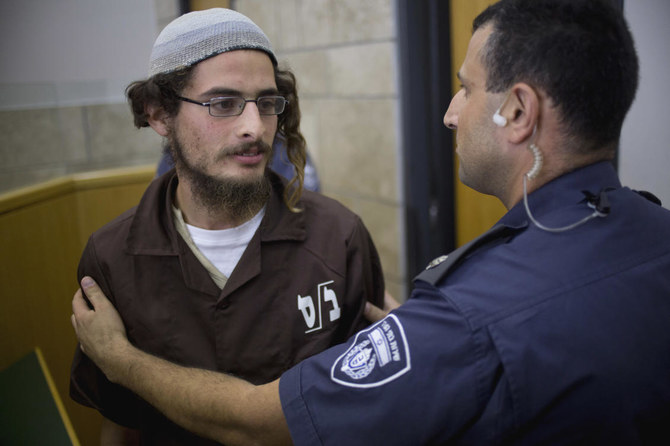
- Announcement comes as West Bank sees some of its worst violence perpetrated by extremist settlers against Palestinians since Gaza war
WASHINGTON: The Biden administration on Friday imposed sanctions on two entities accused of fundraising for extremist Israel settlers already sanctioned, as well as the founder of an organization whose members regularly assault Palestinians.
The Treasury Department announcement comes as the West Bank has seen some of its worst violence perpetrated by extremist settlers against Palestinians since the war in nearby Gaza began.
There is also friction between President Joe Biden and Israeli Prime Minister Benjamin Netanyahu, whose far-right government has reacted angrily to previous sanctions imposed against West Bank settlers.
Included in the Friday sanctions are two entities — Mount Hebron Fund and Shlom Asiraich — accused of raising funds for sanctioned settlers Yinon Levi and David Chai Chasdai.
Both men were previously sanctioned by the Biden administration for violently attacking Palestinians in the West Bank.
The penalties aim to block them from using the US financial system and bar American citizens from dealing with them.
The fundraising campaign established by Mount Hebron Fund for Levi and by Shlom Asiraich for Chasdai generated the equivalent of $140,000 and $31,000, respectively, according to US Treasury.
In Levi’s case, the fund now sanctioned by the Biden administration is linked to the regional council in the area, a body that receives state money. The Biden order Friday stopped short of sanctioning the council itself.
Rights groups say that the expansion of illegal settler outposts in the West Bank is enthusiastically supported by the regional councils and nudged along by Israel’s current national government — the most far-right in the country’s history.
The Biden order also skirted sanctioning crowdfunding websites where funds were raised, GiveChak and New York-based Charidy.
In Chasdai’s case, the fundraiser on Charidy was organized by Shlom Asiraich, which raises money for imprisoned Jewish extremists.
Both online fundraisers have now been taken down. But at least one fundraiser linked to a settler previously sanctioned by the Biden administration, Moshe Sharvit, remains online. As of Friday, the page on GiveChak had raised the equivalent of over $879,000.
Additionally, the State Department is designating Ben-Zion Gopstein, the founder and leader of Lehava, an organization whose members have assaulted Palestinian civilians.
Treasury Deputy Secretary Wally Adeyemo said the organizations “undermine the peace, security, and stability of the West Bank. We will continue to use our tools to hold those responsible accountable.”
In February, Biden issued an executive order that targets Israeli settlers in the West Bank who have been accused of attacking Palestinians and Israeli peace activists in the occupied territory.
Hindu-Muslim divisions sway voting in Indian district scarred by deadly riots

- Villages are largely self-segregated by religion in and around Muzaffarnagar in the most populous Uttar Pradesh state
- Violent clashes broke out in 2013 after two Hindus stabbed Muslim youth to death, accusing him of harassing their sister
MUZAFFARNAGAR: Hindu-Muslim enmity made way for peace in an Indian district that saw deadly riots a decade ago but religious divisions still influence residents who voted on Friday in general elections in which Hindu nationalism is a key theme.
Villages are largely self-segregated by religion in and around Muzaffarnagar district, in the most populous northern state of Uttar Pradesh, but people say there is no longer tension between the majority Hindu and minority Muslim communities.
Violent clashes broke out here in 2013 after two Hindus stabbed a Muslim youth to death, accusing him of sexually harassing their sister. They were later beaten to death by a Muslim mob, which sparked riots that killed about 65 people, mostly Muslims, and displaced thousands.
Violence has not returned to the district known as the country's sugarcane-belt, but political divisions remain as Hindus typically vote for Prime Minister Narendra Modi's Bharatiya Janata Party (BJP) and Muslims for the opposition.
Modi's government has "controlled Muslims", said Ramesh Chand, a Hindu biscuit baker in Kairana city near Muzaffarnagar.
Critics accuse the nationalist BJP of targeting India's 200 million minority Muslims to please their hardline Hindu base - charges they deny.
Modi is widely expected to win a third term on the back of strong growth, welfare and his personal popularity despite some concern about unemployment, price rises and rural distress.
Chand said Modi had improved security in the region. "We can live in peace, whether or not we have jobs ... We can sleep with our doors open."
There were opposing views too.
In Jaula village, sugarcane farmer Mohammed Irfan, 50, said Modi's "high-handedness against Muslims" as well as unemployment and inflation were major reasons for him voting for the opposition Samajwadi Party.
Uttar Pradesh elects 80 lawmakers to the 543-member lower house of parliament, the most among all states, and a strong showing here is critical to the nationwide outcome.
Support for Modi was visible in Kutba Kutbi village, the epicentre of the 2013 riots.
Although there is "brotherhood" between the two communities now, nearly all Muslim families left the village after the riots, said Vinay Kumar Baliyan, 43, a farmer who said he supports Modi for promoting economic growth and raising India's stature globally.
But Irfan said Muslims are expected to vote in larger numbers this time as Eid celebrations this month brought many migrant workers and students home.
After Pakistan alert, WHO likely to issue wider warning on contaminated J&J cough syrup

- The UN health body said it puts out global medical product alerts to ‘encourage diligence’ by authorities
- The WHO this week sent out alert on five batches of contaminated cough syrup ingredients found in Pakistan
LONDON: The World Health Organization is likely to issue a wider warning about contaminated Johnson and Johnson-made children’s cough syrup found in Nigeria last week, it said in an email.
Nigeria’s regulator recalled a batch of Benylin paediatric syrup last Wednesday, having found a high level of diethylene glycol in the product during routine testing.
The contaminant, alongside another closely related toxin, ethylene glycol, has been linked to the deaths of more than 300 children in Cameroon, Gambia, Indonesia and Uzbekistan since 2022, though there is no evidence that these incidents are linked with the latest recalls.
The UN health body said it puts out global medical product alerts to “encourage diligence” by national authorities and was likely to do so in this instance, “subject to confirmation of certain details from parties.”
The recalled batch of Benylin syrup was made by J&J in South Africa in May 2021, although Kenvue now owns the brand after a spin-off from J&J last year.
J&J has referred requests for comment to Kenvue. In an emailed statement on Friday, Kenvue said it had carried out tests on the batch recalled by Nigeria and had not detected either diethylene or ethylene glycol.
“We continue to work closely with health authorities and the WHO and are engaging with NAFDAC to understand their test results, including verifying the authenticity of the sampled product, the testing methodology used, and results reported by the agency,” the statement added.
Since Nigeria’s recall, five other African countries have also pulled the product from shelves — Kenya, Rwanda, Tanzania, Zimbabwe and South Africa, where the drug was made.
South Africa’s regulator has also recalled another batch of the syrup, which is used to treat coughs, hay fever and other allergic reactions in children.
Diethylene glycol is toxic to humans when consumed and can result in acute kidney failure, although there have been no reports of harm in the latest incident.
RAW MATERIALS
In the 2022 cases, the contamination in the syrups came from the raw materials used by manufacturers in India and Indonesia.
The WHO said it was collaborating with both the manufacturer and regulatory authority in South Africa to investigate the Benylin paediatric syrup, and had information on the source of the ingredients used. Kenvue has previously said it tested its ingredients before manufacture.
The agency said the possibility that the syrup was counterfeit was also “under consideration as part of investigations.”
Earlier this week the WHO sent out a separate alert on five batches of contaminated cough syrup ingredients found in Pakistan that appeared to have been falsely labelled as Dow Chemical products.
It was the first alert the WHO has sent on excipients — elements of a medicine other than the active pharmaceutical ingredient — rather than finished products, the agency confirmed on Friday.
The batches of propylene glycol were contaminated with ethylene glycol.
“It was critical for WHO to also alert manufacturers that may have been procuring this material to exercise more caution,” a WHO spokesperson said by email.
Propylene glycol is not an ingredient in Benylin paediatric syrup, a Kenvue spokesperson said on Friday.
Polish flag carrier LOT cancels Friday flights to Tel Aviv and Beirut, PAP reports

- Decisions about future flights would be made on an ongoing basis
WARSAW: Polish national airline LOT canceled flights on Friday to Tel Aviv and Beirut due to the unstable situation in the region, a spokesperson was quoted as saying by state news agency PAP.
“Today’s flight 151/152 to Israel from Warsaw and to Beirut 143/144 have been canceled,” Krzysztof Moczulski told PAP. He said decisions about future flights would be made on an ongoing basis.
French police arrest man who threatened to blow himself up at Iran’s Paris consulate

- Police verifying man’s identity and trying to determine whether he had weapons
PARIS: A man who had threatened to blow himself up at Iran’s consulate in Paris was arrested by police, a police source said.
French police earlier cordoned off the Iranian consulate, Reuters reporters saw, and did not immediately confirm finding any weapons.
A police source told Reuters the man was seen at about 11 am (0900 GMT) entering the consulate, carrying what appeared to be a grenade and explosive vest.
A Paris police official told The Associated Press that officers were verifying the man’s identity and trying to determine whether he had weapons.
Police earlier said they were at the scene and asked the public to avoid the area but provided no further details.
Service was interrupted on a nearby metro line for security reasons, the RATP metro company said.
A police cordon remained in place on Friday afternoon, but traffic was resuming in the area.
A person at the Iranian embassy who responded to a call from Reuters declined to provide any information on the situation.
It was unclear whether the incident had any link to the escalating tensions between Iran and Israel.
Earlier on Friday, explosions echoed over the Iranian city of Isfahan in what sources described as an Israeli attack, but Tehran played down the incident and indicated it had no plans for retaliation — a response that appeared gauged toward averting region-wide war.
The incident also comes as Paris is gearing up to host the summer Olympics.
* With Reuters and AP



